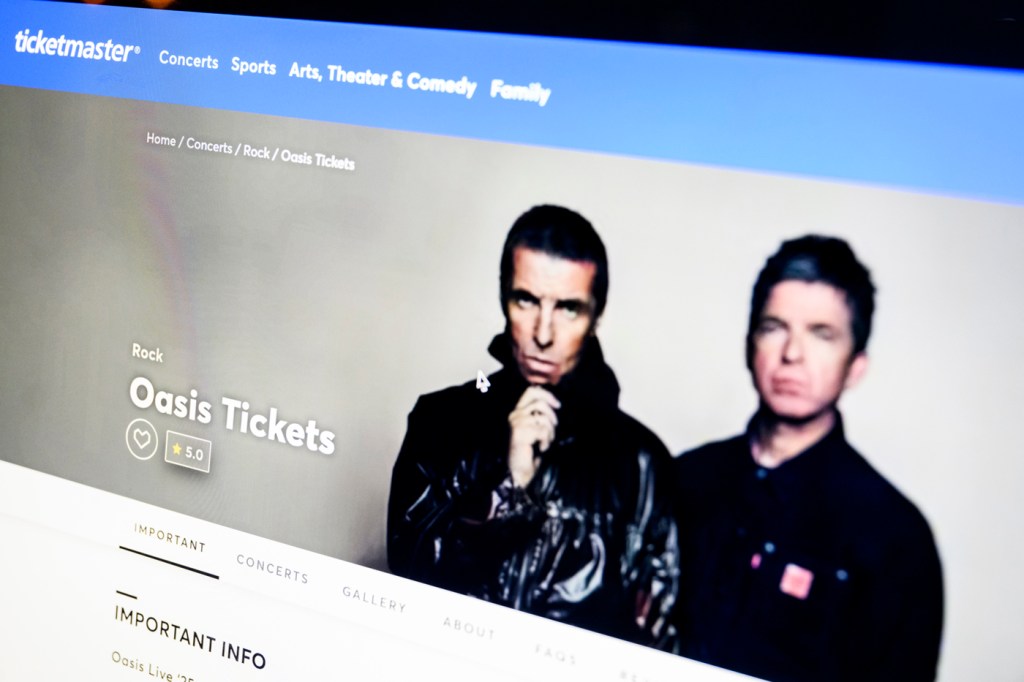What is dynamic pricing and why is it hiking ticket prices for Oasis, Taylor Swift and your favorite artist?
Dynamic pricing was meant to stabilize the market; instead, fans have been hit with spiking ticket costs. How do we fix concert ticketing? A Northeastern music industry expert weighs in.

When Oasis announced it would be returning to the stage for the first time since the groundbreaking ’90s rock band broke up in 2009, fans were excited. But when tickets went on sale, that excitement turned to frustration.
Some fans waited in digital waiting rooms for the majority of a day only to find ticket prices had skyrocketed, pricing some fans out of seeing the band perform for the first time in more than a decade. The reason? Dynamic pricing, or surge pricing, a tool used by ticketing companies, hotels and even Uber to increase prices as demand increases.
The outcry around the Oasis ticketing fiasco was so intense it led the U.K. to launch an investigation into ticketing giant Ticketmaster and its use of dynamic pricing. Meanwhile, Oasis announced it would be abandoning dynamic pricing for the North American leg of its tour.
Dynamic pricing has become common practice in the music industry, especially for high-demand events like Oasis’ reunion tour and Taylor Swift’s Eras Tour. But why is it so common, and what can be done to improve concert ticketing?
Dynamic pricing was created with somewhat good intentions, says Andrew Mall, an associate professor of music at Northeastern University. The live music market has skyhigh demand and limited supply, creating a situation where tickets can be resold on both legitimate and illegitimate markets at five to 10 times the face value.
“The argument really is we want a stable market for supply and demand, and we also want to make sure that if people are willing to pay more money, those profits are going to the people in the industry who are taking the risk and doing the actual work,” Mall says.

Ticketmaster is most famous, or infamous, for using dynamic pricing because of its outsized role in the market. While the company has taken a lot of flak for dynamic pricing, Mall explains, “they don’t do it without getting buy-in from the artist.”
Artists can opt in or out of dynamic pricing when negotiating with Ticketmaster and can even negotiate the terms of how it works. How many tickets will be sold at face value before dynamic pricing kicks in? Is there a ceiling for how high ticket prices can go? All of that is determined by artists, their management and Ticketmaster, Mall says.
Featured Posts
But despite the stated intentions of Ticketmaster and artists who opt in to dynamic pricing, the result is rising ticket prices. So, what can be done to improve ticketing for fans and artists? Mall says it’s a complex balancing act that the industry and, especially, artists are still figuring out.
“The artist can’t win,” as they have to weigh their relationship with fans against the cost of running a tour, Mall explains.
“They go through so much work to put these shows together,” Mall says. “They deserve to get paid for their music, their art, their work. For artists that have ginormous crews, they have dozens, sometimes hundreds, of people and their livelihoods to think about.”
Meanwhile, fans understandably want ticket prices to be as low as possible. Artists have tried and failed to guarantee fans a low price, only for scalpers to scoop up tickets with bots and resell them, Mall says.
There are some basic ways for artists and their management to solve the issue too.
“Can we book three or four dates in each major city? Can we move up to larger venues? Does it make sense for this artist to move up to larger venues? Instead of having dynamic pricing, can we have very clear tiered pricing?” Mall says.
There are also VIP systems that promise perks and reserved tickets for those willing to pay a premium. Ticketmaster has even rolled out its Verified Fan system that grants exclusive access to presale tickets. But even that folded when faced with the tidal wave of demand for Taylor Swift tickets.
One option is to simply increase the supply. In 2013, Kid Rock decided to tour only open-air amphitheaters without tiered seating and set ticket prices at $20 across the board. As each show sold out, he opened another date in the same city, with the goal being to continue playing there until shows stopped selling out.
“Not every artist can do that,” Mall says.
In some ways, the problem might be inevitable, Mall admits, especially for artists like Oasis and Swift. There is simply too much demand and too little supply. Whether it’s dynamic pricing or scalpers reselling tickets, the price is going to increase –– and people are going to pay it.
“This could be a once-in-a-lifetime opportunity,” Mall says. “Going to the Super Bowl isn’t a once-in-a-lifetime opportunity. There’s a Super Bowl every year. … But Oasis may never tour ever again, so people who really want to see them, they’re going to jump through a whole bunch of hoops.”











